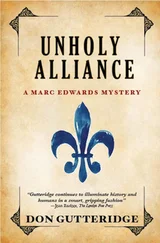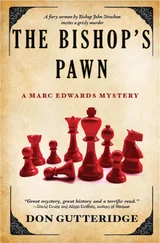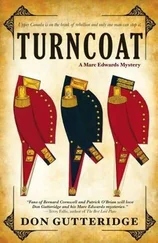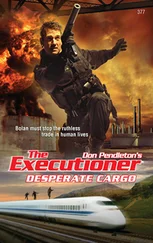Don Gutteridge - Desperate Acts
Здесь есть возможность читать онлайн «Don Gutteridge - Desperate Acts» весь текст электронной книги совершенно бесплатно (целиком полную версию без сокращений). В некоторых случаях можно слушать аудио, скачать через торрент в формате fb2 и присутствует краткое содержание. Год выпуска: 0101, Издательство: Bev Editions, Жанр: Исторический детектив, на английском языке. Описание произведения, (предисловие) а так же отзывы посетителей доступны на портале библиотеки ЛибКат.
- Название:Desperate Acts
- Автор:
- Издательство:Bev Editions
- Жанр:
- Год:0101
- ISBN:нет данных
- Рейтинг книги:4 / 5. Голосов: 1
-
Избранное:Добавить в избранное
- Отзывы:
-
Ваша оценка:
- 80
- 1
- 2
- 3
- 4
- 5
Desperate Acts: краткое содержание, описание и аннотация
Предлагаем к чтению аннотацию, описание, краткое содержание или предисловие (зависит от того, что написал сам автор книги «Desperate Acts»). Если вы не нашли необходимую информацию о книге — напишите в комментариях, мы постараемся отыскать её.
Desperate Acts — читать онлайн бесплатно полную книгу (весь текст) целиком
Ниже представлен текст книги, разбитый по страницам. Система сохранения места последней прочитанной страницы, позволяет с удобством читать онлайн бесплатно книгу «Desperate Acts», без необходимости каждый раз заново искать на чём Вы остановились. Поставьте закладку, и сможете в любой момент перейти на страницу, на которой закончили чтение.
Интервал:
Закладка:
Looking quite pleased with the way theirconversation had progressed and culminated, Nestor said, “Albert.Albert Duggan.”
***
“Before we begin, gentlemen, allow me to summarizeour progress to date, and then indicate my own thought as to how wemight proceed over the coming weeks.” Robert Baldwin – essentiallya private, and even shy, man – was nonetheless given the raptattention of those assembled in the parlour of Baldwin House onthis mid-October evening.
“The floor is yours,” Francis Hincks said.“I’ve had my say in the editorial columns of the Examiner ,”he added with a smile, alluding to the radical newspaper he hadfounded and still operated.
Robert smiled at his friend, political allyand next-door neighbour. “As some of you know in detail, thesuccess of our campaign in the countryside over the course of thesummer and early fall has been beyond our best hopes for it. Thedozens of ‘Durham meetings’ and associated rallies have not onlyproduced a sizeable majority for the cause of responsiblegovernment and the union of the two provinces, but resulted also inan unprecedented number of petitions and well-argued letters to thepapers. Much of this success is due to Marc Edwards here, as he hasbeen the tireless author of pamphlets and speeches – the principalsource of those well-reasoned petitions and cogent letters.”
The dozen men – sitting members of thecurrent, Tory-dominated Assembly, former members like Robert andhis father, the present chair of the Legislative Council (Robert’scousin, Robert Baldwin Sullivan), and several young Reformadherents like Hincks – turned now to Marc and nodded theiragreement.
“Our new governor, Mr. Charles PoulettThomson, of whom more in a moment,” Robert continued, “has broughtwith him the terms of a Union Bill approved by the MotherParliament on condition that it is ratified by both Quebec andUpper Canada. As Quebec is still under direct rule by theGovernor’s Special Council, the terms will be forced on her despitethe fierce opposition there. Hence, the torch has been passed tous. What happens in our Assembly and our Legislative Council in thenext few weeks will determine whether we continue to live aconstrained political and economic existence under the rule of theold-guard Tories and subject to the whims of successive governorsor whether we evolve towards political independence and a system ofgovernance which reflects the will of the majority in the electedAssembly. All we’ve ever asked is to have a cabinet form ofgovernment modelled on the British system.”
“It’s too bad you’re not in the Assemblynow,” said the sitting member for Northumberland County from hisseat by the bow window.
“I don’t think the most important work willbe done there,” Hincks said, looking at Robert forconfirmation.
“Francis is right. All the eloquence orirrefutable logic in the world won’t change the mind of people likeJohn Strachan or Hagerman or Crookshank – dyed-in-the-wool Tories.It’s the handful of moderates in the middle that we must pursue andwin over before the Legislature opens next month.”
“How do you propose to approach them?” RobertSullivan said. “I will need some cogent arguments myself if I am topersuade the old fogies in the Legislative Council to do theirduty.”
Robert’s cousin was an odd figurepolitically. Just a year ago he had spoken out against the unionidea and ensured the defeat of a bill proposing it. He publiclydisparaged French-speaking citizens and their leaders. But he hadrecently become persuaded that Upper Canada was now strong enoughon its own to survive any fusion of the two provinces and todominate its politics, especially since the British proposal beforethem guaranteed that Upper Canada’s huge debt would be absorbed andpaid off – at the expense of the French.
Robert eagerly addressed his cousin’squestion. “Our first argument, always, will be that the Union Billis the will of the home government and by extension the will of theCrown.”
“Precisely,” Hincks said. “The Tories havespent the past five years proclaiming that they are theloyalist party and branding us as an American cabal who secretlywant a republic unfettered by monarchist ties.”
“Secondly, I suggest that we unsettle theplaceholders – the appointed ministers and petty officials who haveachieved near life-tenure under the aegis of the Family Compact andtheir cronyism – by emphasizing that the bill creates a permanentcivil list and, at the same time, calls for all other majorappointments to be held at the pleasure of the current governor.Moreover, when a new governor arrives, as he has just done, he willbe free to replace the sitting ministers and senior civilservants.”
“But won’t that induce the present ministersand Executive Councillors to oppose the bill?” someone on the otherside of the room asked.
“Not if we stress that His Excellency, Mr.Poulett Thomson, has been sent here to make sure that the bill passes ,” Hincks said with some relish. “In short, their owntenure at this moment depends upon their pleasing the currentgovernor, who may be here for many years, and who holds their fatein his hands.”
Murmurs of approval greeted this slystratagem.
“The unrepentant Tories will hang fireanyway,” Robert added, “but moderates like Merritt and Sherwoodwill be looking ahead, not behind. We just want to give thesefellows a bit of a push.”
“And we should also point out to Sherwood andhis group that the provinces are to be equally represented in bothupper and lower houses, even though Quebec has a third largerpopulation,” Hincks said.
“True,” Robert Sullivan said, “but mostTories and many ordinary folk feel that that is still far too greata reward for a populace who revolted against the Crown and who,even now, have been deemed so unfit for parliamentary governmentthat their Assembly has been suspended and they require supervisionby a special council. How do we counter such a view?”
It was a good question, and gained more powerfor having been put by a man who agreed with the sentiment behindit.
“Simple,” Hincks replied, glancing ever sofurtively over at Robert beside him and receiving the briefest nodof approval. “We will tell them that a sizeable minority electedfrom Quebec will perforce be English members, and that so long aswe English stick together on important issues – whatever happens toparty alignments – there is absolutely no danger that the Frenchcan ever outvote us.”
Robert reached over and picked a macaroon outof the bottomless dish on the table beside him – to hide hisembarrassment at this necessary piece of sophistry.
“And, we should add,” Robert Sullivan said, “that within a decade our population will have overtaken theirs, andwe can then move to rep-by-pop, eh?” He seemed inordinatelypleased with this possibility.
At this point, Clement Peachey, the solicitorand workhorse of the Baldwin and Sullivan firm, cleared his throatand said in his customary diffident but clear-headed manner, “Havewe not, Robert, been avoiding the main issue?”
Robert smiled. “More like leaving the hardestpart to last.”
“You’re referring to responsible government?”Dr. Baldwin said. He had been sitting on Robert’s right, takingeverything in but saying nothing so far. His opinion, of course,was appreciated above all others because in addition to being aphysician, a lawyer (and Bencher of the Law Society), an architectand a politician, he had espoused the notion of a cabinet-form ofresponsible government for the province three decades ago, hadtirelessly argued for it, and had raised his son Robert to carry onthe fight, should he himself falter. “As we all know now, despiteLord Durham’s explicit recommendation on behalf of the concept,there is no reference to it in the terms of the Union Bill we areexpected to debate and approve.”
Читать дальшеИнтервал:
Закладка:
Похожие книги на «Desperate Acts»
Представляем Вашему вниманию похожие книги на «Desperate Acts» списком для выбора. Мы отобрали схожую по названию и смыслу литературу в надежде предоставить читателям больше вариантов отыскать новые, интересные, ещё непрочитанные произведения.
Обсуждение, отзывы о книге «Desperate Acts» и просто собственные мнения читателей. Оставьте ваши комментарии, напишите, что Вы думаете о произведении, его смысле или главных героях. Укажите что конкретно понравилось, а что нет, и почему Вы так считаете.












